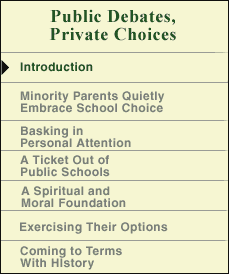Funding for these stories was provided in part by the , which helps underwrite coverage of the changing definition of public schooling.
For when it comes to the education of their children, the five families profiled here all say, ideology and politics come in a distant second. None of these black or Hispanic families was willing to wait for promised improvements in the local schools.

All remain supportive of public education, however. Some say they simply wanted an alternative for a particular child that was not available in district schools, and they still send their other children to public schools.
Whatever these parents’ concerns and perceptions, their families’ stories go beyond impersonal numbers and the constraints of poll questions to help explain the appeal of school choice. Their experiences help illuminate the realities that lie behind the politically charged debate over the growing array of educational options available to or proposed for students in the United States.
“We’re not listening to these parents,” contends Vernard T. Gant, the director of urban school services for the Association of Christian Schools International in Colorado Springs, Colo. “They know what they’re doing.”




